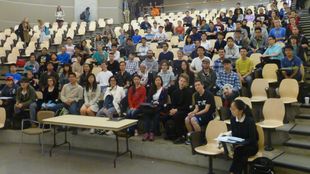14-240/Term Test: Difference between revisions
No edit summary |
|||
| Line 6: | Line 6: | ||
==The Results== |
==The Results== |
||
Excluding some exceptions, |
Excluding some exceptions, 121 students took the test. Before appeals, the average grade was approximately 74 and the standard deviation was approximately 25. The full list of marks (before appeals) was as follows: |
||
<blockquote> |
<blockquote> |
||
100 100 100 100 100 100 100 100 100 100 100 99 99 98 98 98 98 97 97 97 97 97 97 97 97 97 97 96 96 96 96 95 95 95 95 94 94 94 93 93 93 92 92 92 91 91 90 90 90 89 88 88 88 88 88 88 87 87 86 82 82 81 80 79 79 76 74 73 73 71 70 70 70 70 69 69 69 68 62 61 60 60 60 60 59 59 58 58 58 58 54 54 53 53 50 50 50 49 47 45 43 42 41 41 41 40 40 40 39 37 36 35 25 21 18 16 15 8 4 |
100 100 100 100 100 100 100 100 100 100 100 100 99 99 98 98 98 98 98 97 97 97 97 97 97 97 97 97 97 96 96 96 96 95 95 95 95 94 94 94 93 93 93 92 92 92 91 91 90 90 90 89 88 88 88 88 88 88 87 87 86 82 82 81 80 79 79 76 74 73 73 71 70 70 70 70 69 69 69 68 62 61 60 60 60 60 59 59 58 58 58 58 54 54 53 53 50 50 50 49 47 45 43 42 41 41 41 40 40 40 39 37 36 35 25 21 18 16 15 8 4 |
||
</blockquote> |
</blockquote> |
||
Revision as of 10:02, 27 October 2014
| |||||||||||||||||||||||||||||||||||||||||||||||||||||||||
Our Term Test took place at HS 610 (Health Sciences 610) on Tuesday October 21, 1:10PM-3PM. The results are available on the UofT Portal.
The Test: TT-240.pdf.
The Results
Excluding some exceptions, 121 students took the test. Before appeals, the average grade was approximately 74 and the standard deviation was approximately 25. The full list of marks (before appeals) was as follows:
100 100 100 100 100 100 100 100 100 100 100 100 99 99 98 98 98 98 98 97 97 97 97 97 97 97 97 97 97 96 96 96 96 95 95 95 95 94 94 94 93 93 93 92 92 92 91 91 90 90 90 89 88 88 88 88 88 88 87 87 86 82 82 81 80 79 79 76 74 73 73 71 70 70 70 70 69 69 69 68 62 61 60 60 60 60 59 59 58 58 58 58 54 54 53 53 50 50 50 49 47 45 43 42 41 41 41 40 40 40 39 37 36 35 25 21 18 16 15 8 4
The results are quite similar to what I expected them to be. The easiest questions (on average) were the computational ones, the hardest were the ones involving proofs.
How should you read your grade?
- If you got 100 you should pat yourself on your shoulder and feel good.
- If you got something like 95, you're doing great. You made a few relatively minor mistakes; find out what they are and try to avoid them next time.
- If you got something like 85 you're doing fine but you did miss something significant, probably more than just a minor thing. Figure out what it was and make a plan to fix the problem for next time.
- If you got something like 65 you should be concerned. You are still in position to improve greatly and get an excellent grade at the end, but what you missed is quite significant and you are at the risk of finding yourself far behind. You must analyze what happened - perhaps it was a minor mishap, but more likely you misunderstood something major or something major is missing in your background. Find out what it is and try to come up with a realistic strategy to overcome the difficulty!
- If you got something like 45, most likely you are not gaining much from this class and you should consider dropping it, unless you are convinced that you fully understand the cause of your difficulty (you were very sick, you really couldn't study at all for the two weeks before the exam because of some unusual circumstances, something like that) and you feel confident you have a fix for next time. If you do decide to drop the class, don't feel too bad about it. It is the hardest first year algebra class at UofT and of the thousands of students taking math here, very few come with sufficient preparation to do well in it.
Note that problems with writing are problems, period. Perhaps you got a low grade but you feel you know the material enough for a high grade only you didn't write everything you know or you didn't it write well enough or the silly graders simply didn't get what you wrote (and it isn't a simple misunderstanding - see "appeals" below). If this describes you, don't underestimate your problem. If you don't process and resolve it, it is likely to recur.
Appeals.
Remember! We try hard yet grading is a difficult process and mistakes always happen - solutions get misread, parts are forgotten, grades are not added up correctly. You must read your exam and make sure that you understand how it was graded. If you disagree with anything, don't hesitate to complain! (Though first consider very carefully the possibility that the mistake is actually yours). Your first stop should be the person who graded the problem in question, and only if you can't agree with him you should appeal to Dror.
Dror graded problem number 1 and did the data entry. Boris Lishak graded problems 2 and 4, and Nikita Nikolaev graded 3 and 5.
The deadline to start the appeal process is Wednesday November 5 at noon. Once you've started the process by talking to Dror or to Boris or to Nikita, it ends when a final decision is made, with no deadline.
| Dror's notes above / Students' notes below |
I've attempted to make a list of all defined terms and theorems (currently from the textbook chapters 1.1 - 1.6 and appendices A-D, I might add more later) in this [latex, pdf] file. Hopefully someone will find this useful, and I hope this is an appropriate place to post this.

